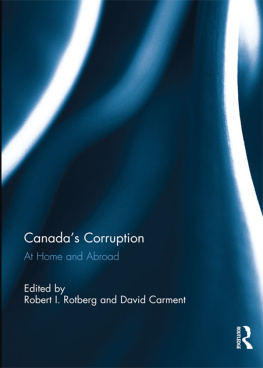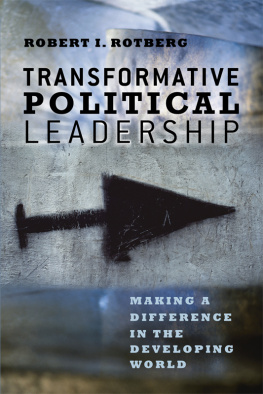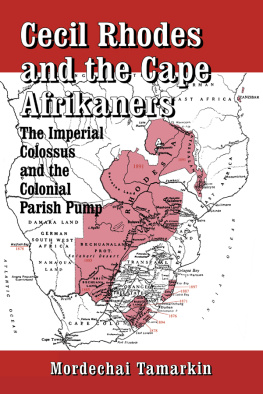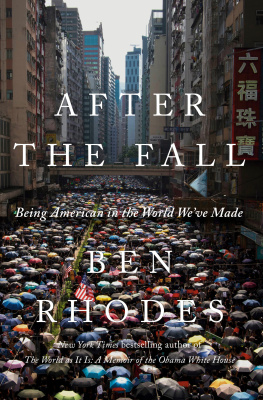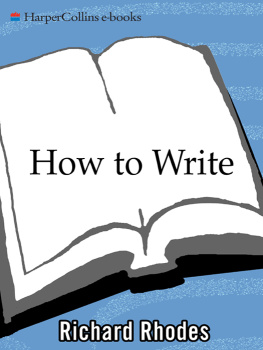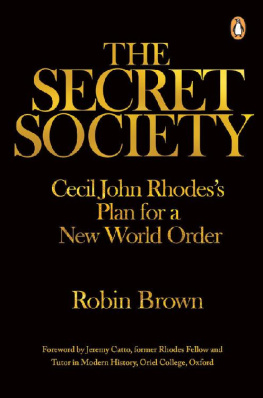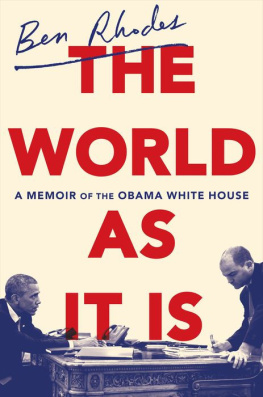THE FOUNDER
THE FOUNDER
Cecil Rhodes and the Pursuit of Power
ROBERT I. ROTBERG
WITH THE COLLABORATION OF
MILES F. SHORE

Oxford University Press
Oxford New York Toronto
Delhi Bombay Calcutta Madras Karachi
Petaling Jaya Singapore Hong Kong Tokyo
Nairobi Dar es Salaam Cape Town
Melbourne Auckland
and associated companies in
Berlin Ibadan
Copyright 1988 by Robert I. Rotberg
Published by Oxford University Press, Inc.,
200 Madison Avenue, New York, New York 10016
Oxford is a registered trademark of Oxford University Press
All rights reserved. No part of this publication may be reproduced,
stored in a retrieval system, or transmitted, in any form or by any
means, electronic, mechanical, photocopying, recording, or otherwise,
without prior permission of Oxford University Press.
Library of Congress Cataloging-in-Publication Data
Rotberg, Robert I.
The founder: Cecil Rhodes and the pursuit of power / Robert I. Rotberg.
p. cm. Bibliography: p. Includes index.
ISBN 0-19-504968-3
1. Rhodes, Cecil, 18531902. 2. StatesmenAfrica, SouthernBiography.
3. Capitalists and financiersAfrica, SouthernBiography.
I. Title.
DT776.R4R66 1988
968.04'092'4dc19 88-5960 CIP
2 4 6 8 9 7 5 3 1
Printed in the United States of America
on acid-free paper
For
my parents
The Grandest Opportunities
A Preface
THE AGENDA WAS defined a decade ago: A biography [of Rhodes] adequate for historians of Africa or of imperialism and a biography in its own right has yet to be written. A wise critic, Jeffrey Butler desired a study which would bring together Rhodes the businessman and Rhodes the politician, Rhodes the creator and ruler of Rhodesia and Rhodes the Cape politician; Rhodes the South African and Rhodes the actor in English politics and money markets; and perhaps above all, Rhodes the formulator of native policy. The major unfinished business for biographers, he suggested, lay in producing a portrait that was psychologically convincing, giving appropriate weight to the favorable and unfavorable aspects of his personality and conduct. Cornelis W. de Kiewiet, who masterfully synthesized the history of South Africa, had earlier written that Rhodes was not one man, but several men who blended their dissimilar and incongruous traits into a firm and successful union. The biographer [had not appeared who could] do justice to the contradictions of the loftiness to which he could rise and the baseness to which he could stoop. Why and how Rhodes proved so creative and effective in all his multifarious pursuits are key questions, and the driving ones of this new biography.
Rudyard Kipling warned, however, that Rhodess personality would be a very difficult thing to translate to a man who did not know him well. That may be why Anthony Sampson, one of the ablest of recent writers, believes that the character of Rhodeswith his combination of shrewdness and adolescence, romanticism and ruthlessness, imagination and vulgarityhas eluded all his biographers. For the same reason Geoffrey Wheatcroft, concluding his study of The Randlords, felt that a satisfactory life of Rhodes is still to seek. For him, and doubtless for many others, the looming gap between [Rhodes] deeds and his unfathomable personality remains.
Part of the problem is that Rhodes wrote no revealing letters to his loved ones. If his own speeches were the only guide, he would emerge omniscient and prescient, with the rough edges sanded round and smooth. He copied favorite sayings from classical authorities, but a manparticularly Rhodesis more than the sum of appealing aphorisms. His commonplace books and jotting notebooks help a little, but nowhere are there recorded intimacies. Neville Pickering, in whom Rhodes may have confided, died young and inexperienced. Sir Leander Starr Jameson and Sir Charles Metcalfe lived on after Rhodes and were talkative, but they loyally protected Rhodes memory. Like so many of Rhodes less central contemporaries, Jameson and Metcalfe helped embroider a past that had been reworked systematically by Rhodes himself.
Rhodes psyche is not the sole puzzle, however, for after many years of thinking about, researching, and preparing to write a long-planned interpretive biography of the Founder, I realized that Rhodes was unlike any of the lives I had earlier examined or written about. In half or two-thirds of a normal lifetime, Rhodes had accomplished far more than most of the empire builders, corporate tycoons, and political giants of the nineteenth century. He had made a fortune, carved out countries, and governed an old colony and two new ones. He was not merely an important overseas figure in the heady last decades of Victorian aggrandizement, but a major actor in Europe as well. It is no accident that his name lives on through the gift of his scholarships. Nor is it surprising that his memory still occasions bitter controversy. Rhodes was great and good, despite his flaws, say his supporters (as they did in his lifetime). Rhodes was despicable and exceptionally evila true roguesay his detractors. (One of the last, more muddleheaded than most, many years ago even argued that writing a biography of Rhodes was wrong. We should not write about bad men!)
Was Rhodes essentially good? Was he a true benefactor who, despite defects of method, not only meant well but also contributedas he intended to the betterment of mankind in Africa? Or, as critics have suggested, was he predominantly a devious power-monger who wanted riches and glory for himself, and deliberately destroyed other individuals, other cultures, and more promising initiatives as he cut his wide way through Africa? Choosing between or reconciling these two views, put only mildly here, is what a biography of Rhodes ultimately should be about. But to compile a balance sheet, and to draw an overall conclusion, turns out to have been too simple a charge.
What I discovered, and what the reader will also discover, is that Rhodes cannot be encompassed or revealed in one dimension. Rhodes achieved as much as he did because his energy and vision were greater than those of his contemporaries. He was involved on a daily basis in more initiatives, more schemes, and more dreams than most of us can juggle (or even encompass) in weeks, if not months. His pursuits were myriad, interactive, tangled, little recorded, and of a high and important order. In a word which cannot fully convey the sense of what Rhodes did and thought, his life was complex. He thought about many endeavors simultaneously, and carried within himself and in his head at all times the germs and the details of projects small and large which were by turns practical and improbable, ideal and sordid, and generous and ruthless. It is less that Rhodes personality was enigmatic than that it was magnificently multifaceted. He was larger than life, and the favor and enmity that his name still evokes are appropriate responses.
For all those reasons, it became clear that the Founder required a wholly new, complete biography which would incorporate a detailed examination of Rhodes personality. In order to comprehend Rhodes, everything that he touched, influenced, meddled with, created, and destroyed had to be understood. A new biography had to examine his philosophy, his life style, his sexual preferences, his relations with others, and his compassion or lack of compassion. It had to measure his impact on his age, on the country of his birth and on his several adopted countries, and on such epochal events as the consolidation of diamond mining, the extraction of gold, the start of the Anglo-Boer War, and, implicitly, todays bitterly divided South Africa. It had to articulate why a man of crowned glory involved himself so unnecessarily in an exercise as destructive and treacherous as the Jameson Raid. Why did the same man who went unprotected into the Matopos mountains to make peace with the warring Ndebele also behave with callous contempt toward the political rights of Africans in the Cape Colony? Jane Waterston, a missionary doctor, prayed that he might be delivered from being one of those to whom the grandest opportunities have been given by Providence & who flung them away. She believed that he could have success in every right waythat he could be the conqueror of Rhodesia as well as the great chief that ruled the many thousands of natives wisely & well. Since Rhodes himself always believed that he could be the man whom Waterston wanted, indeed that he


